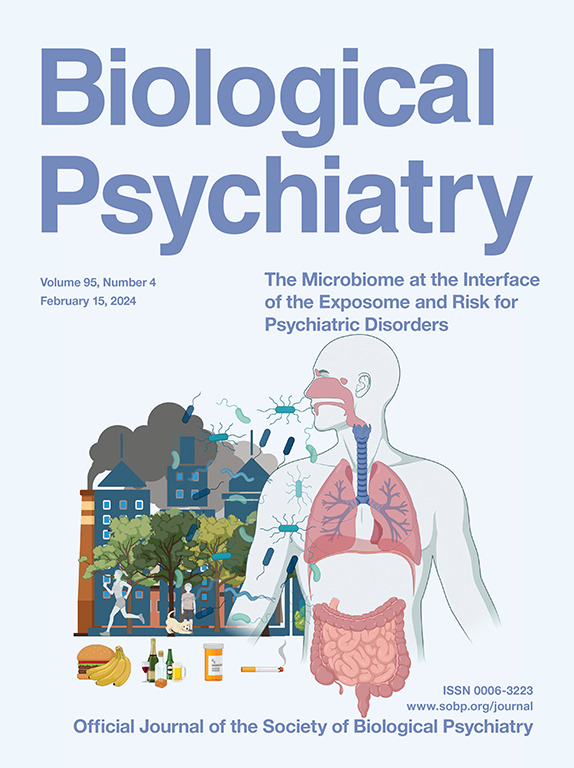Effect of Antidepressant Treatment on 5-HT4 Receptor Binding and Associations With Clinical Outcomes and Verbal Memory in Major Depressive Disorder
IF 9.6
1区 医学
Q1 NEUROSCIENCES
引用次数: 0
Abstract
Background
Brain serotonin 4 receptor (5-HT4R) levels are lower in untreated patients with major depressive disorder (MDD) and are linked to verbal memory. Here, we investigated the relationship between 5-HT4R levels, clinical outcomes, and cognitive function in patients with MDD who initiated selective serotonin reuptake inhibitor drug treatment.
Methods
Ninety patients with moderate to severe depression underwent molecular brain imaging to measure 5-HT4R binding prior to antidepressant treatment with escitalopram. Pretreatment 5-HT4R binding was assessed for its ability to predict treatment outcome at weeks 4, 8, or 12. In 40 patients who were rescanned 8 weeks posttreatment, change in cerebral 5-HT4R binding was correlated with change in verbal memory and with change in depressive symptoms, as evaluated by the 6-item Hamilton Depression Rating Scale.
Results
After 8 weeks of serotonergic intervention, neostriatal 5-HT4R binding was reduced by 9%. Global change in 5-HT4R binding from baseline was associated with verbal memory outcomes, but not with overall clinical depressive symptom outcomes. Pretreatment 5-HT4R binding did not predict clinical recovery status at week 8 and was not associated with change in the 6-item Hamilton Depression Rating Scale scores.
Conclusions
In patients with moderate to severe MDD, treatment with selective serotonin reuptake inhibitors downregulated neostriatal 5-HT4R levels, which is consistent with the notion that the drugs increase cerebral extracellular serotonin. The less global brain 5-HT4R levels were downregulated after selective serotonin reuptake inhibitors, the more verbal memory improved, highlighting the potential importance of 5-HT4R as a treatment target in MDD. The findings offer insights into mechanisms that underlie antidepressant effects and point to new directions for precision medicine treatments for MDD.
抗抑郁治疗对重度抑郁症患者 5-HT4 受体结合的影响及其与临床疗效和言语记忆的关系。
背景:未经治疗的重度抑郁症(MDD)患者脑内5-羟色胺4受体(5-HT4R)水平较低,且与言语记忆有关。我们在此研究开始接受 SSRI 药物治疗的 MDD 患者的 5-HT4R、临床结果和认知功能之间的关系:方法:90 名中度至重度抑郁症患者在接受艾司西酞普兰抗抑郁治疗前接受了分子脑成像,以测量 5-HT4R 结合力。对治疗前的 5-HT4R 结合力进行评估,以确定其预测第 4、8 或 12 周治疗结果的能力。在治疗 8 周后重新扫描的 40 名患者中,大脑 5-HT4R 结合力的变化与言语记忆的变化和抑郁症状的变化相关,抑郁症状的变化由汉密尔顿抑郁评分量表 6 (HAMD6) 评估:结果:经过8周的血清素能干预后,新纹状体5-HT4R结合率降低了9%。与基线相比,5-HT4R结合力的总体变化与言语记忆结果有关,但与总体临床抑郁症状结果无关。治疗前的5-HT4R结合力不能预测第8周时的临床康复状况,也与HAMD6的变化无关:结论:在中度至重度 MDD 患者中,SSRI 治疗会下调新纹状体 5-HT4R 水平,这与药物会增加脑细胞外血清素的观点一致。服用SSRI后,大脑5-HT4R水平下调的幅度越小,言语记忆改善的幅度就越大,这凸显了5-HT4R作为MDD治疗靶点的潜在重要性。这些研究结果为抗抑郁剂的作用机制提供了见解,并为MDD的精准医学治疗指明了新方向。
本文章由计算机程序翻译,如有差异,请以英文原文为准。
求助全文
约1分钟内获得全文
求助全文
来源期刊

Biological Psychiatry
医学-精神病学
CiteScore
18.80
自引率
2.80%
发文量
1398
审稿时长
33 days
期刊介绍:
Biological Psychiatry is an official journal of the Society of Biological Psychiatry and was established in 1969. It is the first journal in the Biological Psychiatry family, which also includes Biological Psychiatry: Cognitive Neuroscience and Neuroimaging and Biological Psychiatry: Global Open Science. The Society's main goal is to promote excellence in scientific research and education in the fields related to the nature, causes, mechanisms, and treatments of disorders pertaining to thought, emotion, and behavior. To fulfill this mission, Biological Psychiatry publishes peer-reviewed, rapid-publication articles that present new findings from original basic, translational, and clinical mechanistic research, ultimately advancing our understanding of psychiatric disorders and their treatment. The journal also encourages the submission of reviews and commentaries on current research and topics of interest.
 求助内容:
求助内容: 应助结果提醒方式:
应助结果提醒方式:


